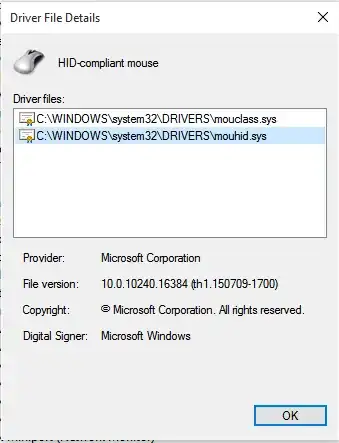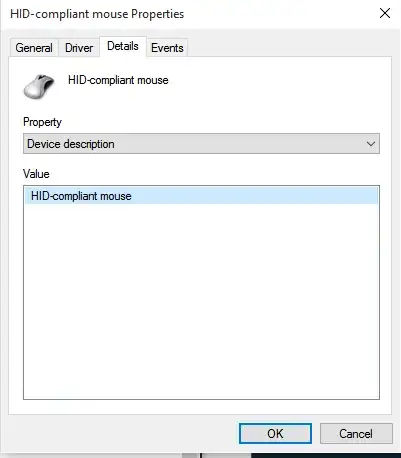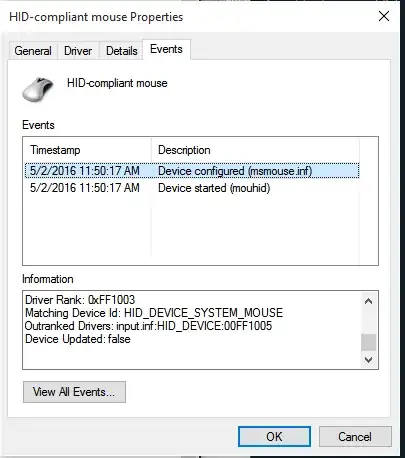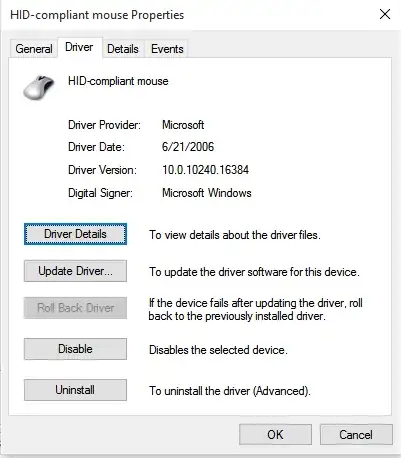Aim:
I have a whiteboard which emulates as mouse. Thus, when you click and drag on the whiteboard it should move the cursor.
I want to make a whiteboard work in Ubuntu
It works on windows.
Device information:
the output of cat /proc/bus/input which contains the device information
I: Bus=0003 Vendor=4623 Product=011a Version=0111
N: Name="Hite Board-XXXXXXXX"
P: Phys=usb-0000:00:14.0-1/input0
S: Sysfs=/devices/pci0000:00/0000:00:14.0/usb1/1-1/1-1:1.0/
U: Uniq=
H: Handlers=mouse2 event13
B: PROP=2
B: EV=b
B: KEY=400 0 0 0 0 0
B: ABS=260800000000003
abhishek@vaio:~$ lsusb -d 4623:011a -v
Bus 001 Device 012: ID 4623:011a
Couldn't open device, some information will be missing
Device Descriptor:
bLength 18
bDescriptorType 1
bcdUSB 2.00
bDeviceClass 0 (Defined at Interface level)
bDeviceSubClass 0
bDeviceProtocol 0
bMaxPacketSize0 64
idVendor 0x4623
idProduct 0x011a
bcdDevice 0.01
iManufacturer 1
iProduct 2
iSerial 0
bNumConfigurations 1
Configuration Descriptor:
bLength 9
bDescriptorType 2
wTotalLength 73
bNumInterfaces 2
bConfigurationValue 1
iConfiguration 0
bmAttributes 0x80
(Bus Powered)
MaxPower 150mA
Interface Descriptor:
bLength 9
bDescriptorType 4
bInterfaceNumber 0
bAlternateSetting 0
bNumEndpoints 2
bInterfaceClass 3 Human Interface Device
bInterfaceSubClass 0 No Subclass
bInterfaceProtocol 0 None
iInterface 0
HID Device Descriptor:
bLength 9
bDescriptorType 33
bcdHID 1.11
bCountryCode 0 Not supported
bNumDescriptors 1
bDescriptorType 34 Report
wDescriptorLength 429
Report Descriptors:
** UNAVAILABLE **
Endpoint Descriptor:
bLength 7
bDescriptorType 5
bEndpointAddress 0x81 EP 1 IN
bmAttributes 3
Transfer Type Interrupt
Synch Type None
Usage Type Data
wMaxPacketSize 0x0040 1x 64 bytes
bInterval 8
Endpoint Descriptor:
bLength 7
bDescriptorType 5
bEndpointAddress 0x01 EP 1 OUT
bmAttributes 3
Transfer Type Interrupt
Synch Type None
Usage Type Data
wMaxPacketSize 0x0040 1x 64 bytes
bInterval 1
Interface Descriptor:
bLength 9
bDescriptorType 4
bInterfaceNumber 1
bAlternateSetting 0
bNumEndpoints 2
bInterfaceClass 3 Human Interface Device
bInterfaceSubClass 0 No Subclass
bInterfaceProtocol 0 None
iInterface 6
HID Device Descriptor:
bLength 9
bDescriptorType 33
bcdHID 1.10
bCountryCode 33 US
bNumDescriptors 1
bDescriptorType 34 Report
wDescriptorLength 91
Report Descriptors:
** UNAVAILABLE **
Endpoint Descriptor:
bLength 7
bDescriptorType 5
bEndpointAddress 0x82 EP 2 IN
bmAttributes 3
Transfer Type Interrupt
Synch Type None
Usage Type Data
wMaxPacketSize 0x0040 1x 64 bytes
bInterval 1
Endpoint Descriptor:
bLength 7
bDescriptorType 5
bEndpointAddress 0x02 EP 2 OUT
bmAttributes 3
Transfer Type Interrupt
Synch Type None
Usage Type Data
wMaxPacketSize 0x0040 1x 64 bytes
bInterval 1
Since bInterfaceProtocol is None, linux doesn't recognize it as a mouse input device.
What's ideal approach to reverse engineering it from windows to make it work in linux.
Device in windows device manager:
Edit 1:
abhishek@vaio:~/dev_work/whiteboard/pyusbwhiteboard$ usb-devices | grep -A5 'Vendor=4623 ProdID=011a' | grep Driver
I: If#= 0 Alt= 0 #EPs= 2 Cls=03(HID ) Sub=00 Prot=00 Driver=usbfs
I: If#= 1 Alt= 0 #EPs= 2 Cls=03(HID ) Sub=00 Prot=00 Driver=usbhid
dmesg output: http://codepad.org/fFtwryw6



